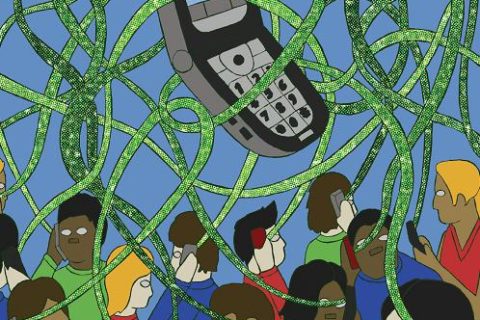First in our series of research heroes for RW Connect is George Loewenstein who is the Herbert A. Simon Professor of Economics and Psychology at Carnegie Mellon University. After receiving his PhD from Yale University in 1985, he has held academic positions at The University of Chicago and Carnegie Mellon University, among many others. He is considered as one of the founders of the field of behavioral economics and more recently of the field of neuroeconomics. He is also past president of the Society for Judgment and Decision Making. His prolific research focuses on applications of psychology to economics, with specific interests in e.g. decision making over time, psychology and health, the role of emotion in decision making, the psychology of curiosity.
I wish someone had told me at the beginning of my career that everything was going to turn out fine. Of course no one could have told me, because no one knew, and people probably did tell me, but I didn’t believe them. But, it pains me to think of all the unnecessary anguish I went through being uncertain, and even doubtful, about how things would turn out. Some insecurity is probably motivating, but too much is counterproductive. So, I would say “don’t sweat it; it’s not worth it.” Brave men die once, cowards a thousand times. Be brave.
I most admire… Perhaps because I’m not much of a theorist myself, so theory seems a magical to me, I most admire Matthew Rabin, Botond Koszegi and Roland Benabou. I admire Rabin and Koszegi because their models are so psychologically insightful; they make you see the world differently. I admire Benabou because he produces incredibly elegant models about things that really matter, like groupthink and destructive ideologies, and because, with remarkably few and simple assumptions, his models inevitably generate an amazing range of sensible and nuanced predictions.
The best research project I have worked on during my career was really a set of projects that got started when Drazen Prelec and I spent a year together at the Russell Sage Foundation in New York. We had met only once, briefly, before we were thrown together at RSF, living in adjoining apartment on the same floor of a building. It was a fabulously stimulating and enjoyable collaboration that continues as a close friendship. I miss it, though I can’t complain right now; at CMU I’m surrounded by the most remarkably stimulating and talented group of young researchers I have ever had the fortune to work with.
The worst research project I have worked on during my career was one I got involved in early on, as a result taking pity on a colleague at the University of Chicago who told me a terrible story of having been horribly abused by her last collaborator. By the time we had completed the project, and it was a miracle that we did, I realised that I was working with someone who would always end up feeling mistreated by, and resentful toward, all her collaborators. I learned the hard way that you can’t trust the narrative of a conflict when you only hear one side of it, and I also learned to only collaborate with people I was confident I would enjoy spending time with.
The most amazing or memorable experience when I was doing research was on a flight from Chicago to Islip, NY. I used to take advantage of all opportunities for data collection and, on that flight, exploited proximity to all the bored people on the plane by distributing the different stimuli of an experiment to each row of travelers: “I am a professor at the University of Chicago, doing research on xx. It would be very helpful to my research if you would answer these questions…”. When the flight attendant figured out what I had done, she collected the surveys in a fury, apologising profusely to the totally unperturbed travelers, told me that I would be arrested when we landed (which I didn’t take too seriously), and informed me that she was going to show the evidence of my crime (the surveys!) to the pilot. As I was exiting the plane, checking to see if the police were waiting for me at the end of the exit ramp, the pilot came out of the cockpit, and, wearing a huge smile, told me that he was getting an MBA at the University of Chicago and wanted to hear more about the project.
The one story I always wanted to tell but never had a chance… In teaching, there have been ample opportunities to tell any stories I wanted to tell, and I’ve probably told too many (including, undoubtedly, unsuitable ones).
A research project I wish I had done… I was jogging with a friend and told him that, when I retired, I wanted to study sex. He reminded me that I was tenured and had the freedom to do whatever I wanted; if I was so interested in studying sex, why would I wait till retirement? I took his advice, so again I can’t answer the question. Following his sage guidance, from that point on, if there is a research project I really want to do, regardless of what it is, I do it.
If I wasn’t doing this, I would be a civil engineer designing bridges; I’ve always admired the beauty and functionality of bridges, and as a child I used to build bridges out of Lego, obsessively. I’m glad, however, that I’m doing what I’m doing – I’m a pretty good researcher but probably would have been a pathetic bridge designer. If I ended up designing bridges at all, it would probably have been those ugly concrete monstrosities that span highways.
The biggest challenge for our field in the next 10 years is digging some new foundations. For forty years now, we have been largely building on the foundational insights of Kahneman and Tversky from the late 1970s. Our field has proven incredibly dynamic in adapting to, and even pioneering new research methods – incentivised choice experiments, field studies, field experiments, neuroscience methods, big data… I think we need some really exciting new ideas to replace, or at least occupy a position beside the by-now old standbys – overconfidence, loss aversion, hyperbolic time discounting, etc..
My advice for young researchers at the start of their career is exactly the same as Hal Arkes’ advice: work on topics you feel passionate about. Intrinsic motivation is infinitely more compelling than extrinsic motivation. The only (or at least best) way to put in the hours necessary to be a successful academic is to do research you are so excited about that, instead of forcing yourself to do it, you need to exercise self-control to get yourself to take a break.
First published on the InDecision blog. The InDecision Blog is run by Elina Halonen and Neda Kerimi for early career researchers in the field of judgment and decision-making psychology. Their aim is to give younger scholars a voice, reach a wider audience with their work and give everyone a chance to see what happens inside decision-making science.


